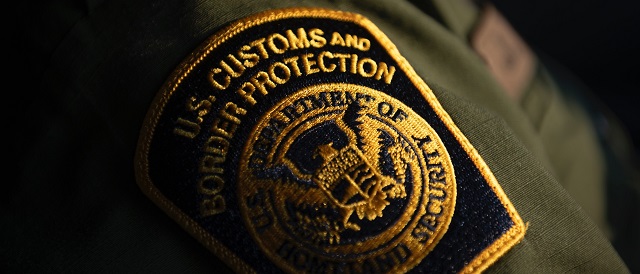illegal immigration
Biden Admin Pauses Migrant Flight Program Amid Reports Of Massive Fraud

From the Daily Caller News Foundation
The Biden administration has pumped the brakes on a controversial program that has flown hundreds of thousands of migrants into the country following an internal report of rampant fraud.
The Department of Homeland Security (DHS) paused a mass-parole program for Cubans, Haitians, Nicaraguans, and Venezuelans, otherwise known as CHNV, a spokesperson confirmed to the Daily Caller News Foundation on Friday. Since its creation under the Biden administration, the CHNV program has allowed thousands of migrants from these countries to legally enter the U.S. each month after meeting certain parole guidelines.
“Out of an abundance of caution, DHS has temporarily paused the issuance of advanced travel authorizations for new beneficiaries while it undertakes a review of supporter applications,” a DHS spokesperson told the DCNF. “DHS will restart application processing as quickly as possible, with appropriate safeguards.”
The spokesperson noted that DHS takes fraud “very seriously” and added that wherever fraud is uncovered “Immigration and Customs Enforcement (ICE) will investigate and litigate applicable cases in immigration court and make criminal referrals to the Department of Justice.”
Fox News first reported on DHS’ decision to put a hold on the CHNV program.
The internal report was obtained by the Federation for American Immigration Reform (FAIR), a Washington, D.C.-based group that advocates for more strict immigration policies.
The report found that 100,948 forms had been filled out by just 3,218 sponsors; 24 of the 1,000 most used Social Security numbers by sponsors belonged to a dead person; and an IP address located in Tijuana, Mexico was used more than 1,300 times, among other examples.
Additionally, many sponsors did not list their income, and those that did reveal their income did not meet financial threshold to support the number of parolees they intended to sponsor.
“This admission by the Biden-Harris administration vindicates every warning we have ever issued about the unlawful CHNV mass-parole program,” House Homeland Security Chairman Mark Green stated about the internal audit. “It also exposes the lie by administration officials, like now-impeached DHS Secretary Mayorkas, about the quality and extent of the vetting process — not just for the inadmissible aliens seeking entry, but those attempting to sponsor them.”
“This is exactly what happens when you create an unlawful mass-parole program in order to spare your administration the political embarrassment and bad optics of overrun borders,” Green continued. “The Biden-Harris administration should terminate the CHNV program immediately.”
The CHNV program was first announced for Venezuelans in October 2022, allowing a limited number of them to travel into the U.S. if they had not previously entered the country illegally, had an American sponsor and passed other vetting processes. The Biden administration expanded the program in January 2023 to include Haitians, Nicaraguans and Cubans, giving them work permits and two-year authorization to reside in the U.S.
Roughly half a million inadmissible aliens have arrived at U.S. ports of entry through the CHNV program since January 2023, according to the House Homeland Security Committee.
Featured Image Credit: Flickr/U.S. Department of Homeland Security
illegal immigration
US Notes 2.5 million illegals out and counting

President Trump’s Department of Homeland Security is marking what officials are calling a landmark moment in U.S. immigration enforcement, announcing Wednesday that more than 2.5 million illegal aliens have now left the country since Trump returned to the Oval Office in January. DHS Secretary Kristi Noem said the surge reflects a sweeping, sustained crackdown driven by Immigration and Customs Enforcement teams that — according to internal tallies — have already removed more than 605,000 illegal aliens, most of whom were facing criminal charges or carrying prior convictions. Nearly two million more have opted to self-deport, a wave Noem attributes to stepped-up enforcement and the administration’s aggressive public messaging. She again urged those still in the country illegally to use the government’s CBP Home app, which offers a free one-way flight and a $1,000 stipend to expedite departure.
Senior DHS officials say arrests have climbed as well, with almost 600,000 illegal aliens taken into custody since January 20. “Illegal aliens are hearing our message to leave now,” DHS official McLaughlin said this week. “They know if they don’t, we will find them, we will arrest them, and they will never return.”
The administration argues the impact is being felt far beyond immigration courts and detention facilities, pointing to the U.S. housing market as one of the clearest signs of change. For six straight months, DHS says not a single illegal alien has been released into the interior from the southern border — a dramatic shift after years of mass inflows under President Biden. That decline, they say, is finally filtering into rent and home-price data after years of punishing increases.
Housing and Urban Development Secretary Scott Turner said Americans have now seen four consecutive months of rent decreases — the first sustained drop in years — as fewer illegal aliens compete for housing. Vice President JD Vance emphasized the connection even more bluntly: “The connection between illegal immigration and skyrocketing housing costs is as clear as day. We are proud to be moving in the right direction. Still so much to do.”
Research abroad and at home backs up the administration’s argument. Economists in Denmark released findings earlier this year showing that a one-percentage-point rise in local immigration over a five-year period drove private rental prices up roughly 6 percent and home prices up about 11 percent. The Center for Immigration Studies presented similar data to Congress last year, with researcher Steven Camarota testifying that a 5-percentage-point increase in a metro area’s recent-immigrant share was tied to a 12-percent rise in rent for U.S.-born households.
As DHS leaders frame it, Trump’s second-term enforcement machine is reshaping both border policy and household budgets — an approach they say is finally delivering relief to Americans who spent years squeezed by soaring housing costs and unchecked migration.
illegal immigration
EXCLUSIVE: Canadian groups, First Nation police support stronger border security

First Nation police chiefs join Texas Department of Public Safety marine units to patrol the Rio Grande River in Hidalgo County, Texas. L-R: Dwayne Zacharie, President of the First Nations Chiefs of Police Association, Ranatiiostha Swamp, Chief of Police of the Akwesasne Mohawk Territory, Brooks County Sheriff Benny Martinez, Jamie Tronnes, Center for North American Prosperity and Security, Goliad County Sheriff Roy Boyd. Photo: Bethany Blankley for The Center Square
From The Center Square
By
Despite Canadian officials arguing that the “Canada-U.S. border is the best-managed and most secure border in the world,” some Canadian groups and First Nation tribal police chiefs disagree.
This week, First Nation representatives traveled to Texas for the first time in U.S.-Canadian history to find ways to implement stronger border security measures at the U.S.-Canada border, including joining an Operation Lone Start Task Force, The Center Square exclusively reported.
Part of the problem is getting law enforcement, elected officials and the general public to understand the reality that Mexican cartels and transnational criminal organizations are operating in Canada; another stems from Trudeau administration visa policies, they argue.
When it comes to public perception, “If you tell Canadians we have a cartel problem, they’ll laugh at you. They don’t believe it. If you tell them we have a gang problem, they will absolutely agree with you 100%. They don’t think that gangs and cartels are the same thing. They don’t see the Hells Angels as equal to the Sinaloa Cartel because” the biker gang is visible, wearing vests out on the streets and cartel operatives aren’t, Jamie Tronnes, executive director of the Center of North American Prosperity and Security, told The Center Square in an exclusive interview.
The center is a US-based project of the MacDonald-Laurier Institute, the largest think tank in Canada. Tronnes previously served as a special assistant to the cabinet minister responsible for immigration and has a background in counterterrorism. She joined First Nation police chiefs to meet with Texas law enforcement and officials this week.
Another Canadian group, Future Borders Coalition, argues, “Canada has become a critical hub for transnational organized crime, with networks operating through its ports, banks, and border communities.” The Sinaloa and Jalisco New Generation Mexican cartels control the fentanyl, methamphetamine and cocaine business in Canada, partnering with local gangs like the Hells Angels and Chinese Communist Party (CCP)-linked actors, who launder profits through casinos, real estate, and shell companies in Vancouver and Toronto, Ammon Blair, a senior fellow at the Texas Public Policy Foundation, and others said at a coalition event prior to First Nation police chiefs and Tronnes coming to Texas.
“The ’Ndrangheta (Italian Mafia) maintains powerful laundering and import operations in Ontario and Quebec, while MS-13 and similar Central American gangs facilitate human smuggling and enforcement. Financial networks tied to Hezbollah and other Middle Eastern groups support laundering and logistics for these criminal alliances,” the coalition reports.
“Together, they form interconnected, technology-driven enterprises that exploit global shipping, cryptocurrency, and AI-enabled communications to traffic whatever yields profit – narcotics, weapons, tobacco, or people. Taking advantage of Canada’s lenient disclosure laws, fragmented jurisdictions, and weak cross-border coordination, these groups have embedded themselves within legitimate sectors, turning Canada into both a transit corridor and safe haven for organized crime,” the coalition reports.
Some First Nation reservations impacted by transnational crime straddle the U.S.-Canada border. One is the Akwesasne Mohawk Reservation, located in Ontario, Quebec, and in two upstate New York counties, where human smuggling and transnational crime is occurring, The Center Square reported. Another is the Tsawwassen First Nation (TWA) Reservation, located in a coastal region south of Vancouver in British Columbia stretching to Point Roberts in Washington state, which operates a ferry along a major smuggling corridor.
Some First Nation reservations like the TWA are suffering from CCP organized crime, Tronnes said. Coastal residents observe smugglers crossing their back yards, going through the reserve; along Canada’s western border, “a lot of fentanyl is being sent out to Asia but it’s also being made in Canada,” Tronnes said.
Transnational criminal activity went largely unchecked under the Trudeau government, during which “border security, national security and national defense were not primary concerns,” Tronnes told The Center Square. “It’s not to say they weren’t concerns, but they weren’t top of mind concerns. The Trudeau government preferred to focus on things like climate change, international human rights issues, a feminist foreign policy type of situation where they were looking more at virtue signaling rather than securing the country.”
Under the Trudeau administration, the greatest number of illegal border crossers, including Canadians, and the greatest number of known, suspected terrorists (KSTs) were reported at the U.S.-Canada border in U.S. history, The Center Square first reported. They include an Iranian with terrorist ties living in Canada and a Canadian woman who tried to poison President Donald Trump, The Center Square reported.
“Had it been a priority for the government to really crack down and provide resources for national security,” federal, provincial and First Nation law enforcement would be better equipped, funded and staffed, Tronnes said. “They would have better ways to understand what’s really happening at the border.”
In February, President Donald Trump for the first time in U.S. history declared a national emergency at the northern border and ordered U.S. military intervention. Months later, his administration acknowledged the majority of fentanyl and KSTs were coming from Canada, The Center Square reported.
Under a new government and in response to pressure from Trump, Canada proposed a $1.3 billion border plan. However, more is needed, the groups argue, including modernizing border technology and an analytics infrastructure, reforming disclosure and privacy rules to enable intelligence sharing, and recognizing and fully funding First Nation police, designating them as essential services and essential to border security.
“National security doesn’t exist without First Nation policing at the border,” Dwayne Zacharie, First Nations Chiefs of Police president, told The Center Square.
-

 Censorship Industrial Complex2 days ago
Censorship Industrial Complex2 days agoDeath by a thousand clicks – government censorship of Canada’s internet
-

 Alberta2 days ago
Alberta2 days agoSchools should go back to basics to mitigate effects of AI
-

 Daily Caller2 days ago
Daily Caller2 days agoChinese Billionaire Tried To Build US-Born Baby Empire As Overseas Elites Turn To American Surrogates
-

 Great Reset2 days ago
Great Reset2 days agoViral TikTok video shows 7-year-old cuddling great-grandfather before he’s euthanized
-

 Health12 hours ago
Health12 hours agoSaskatchewan woman approved for euthanasia urged to seek medical help in Canada rather than US
-

 Health17 hours ago
Health17 hours agoCanadian gov’t considers sharing census data on gender-confused children
-

 International12 hours ago
International12 hours agoFBI didn’t think it had cause to raid Trump but DOJ did it anyway
-

 Business2 days ago
Business2 days agoMajor tax changes in 2026: Report




